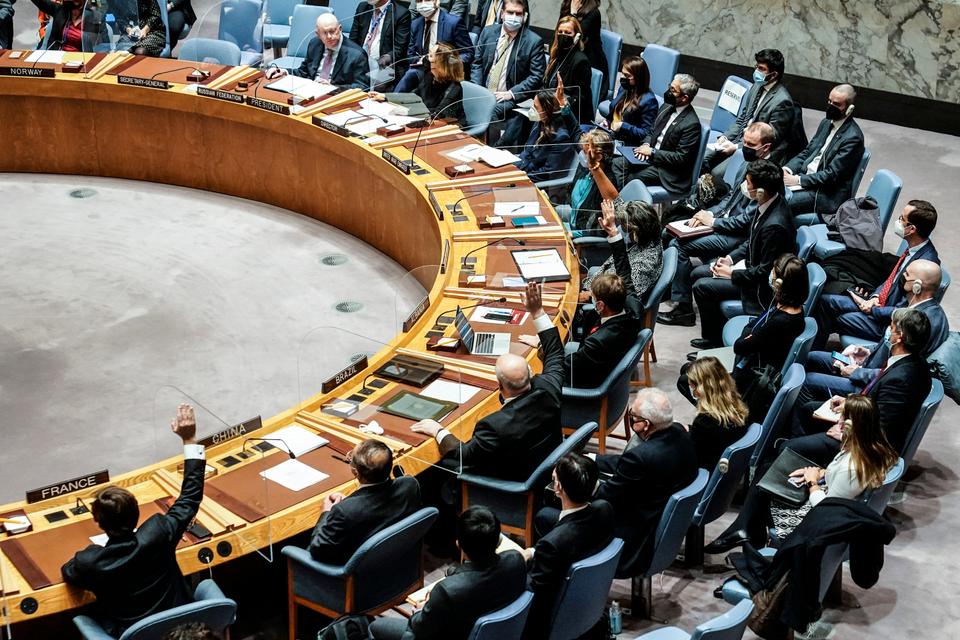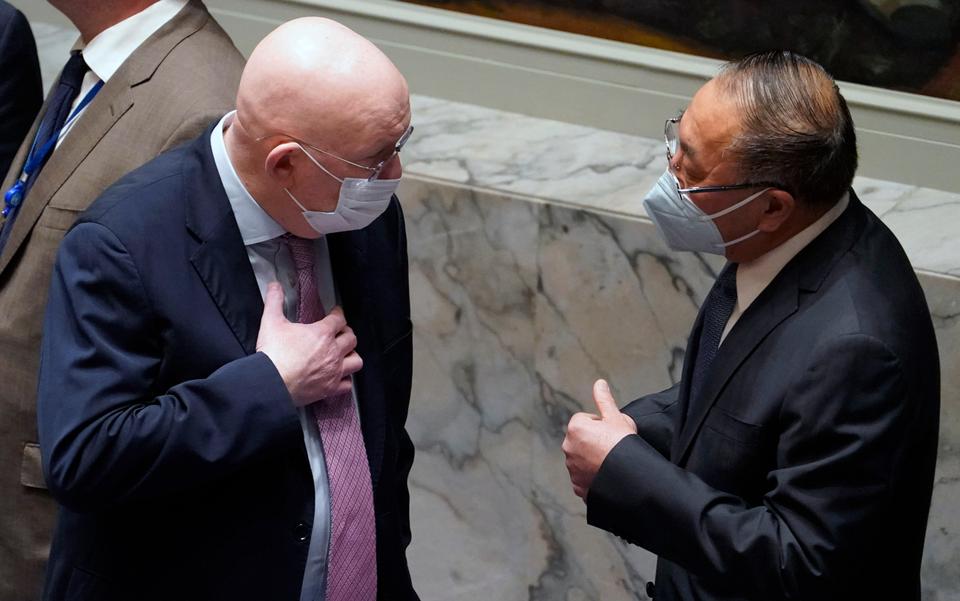China has usually chosen to be a lowkey player in different conflicts. In the Ukraine-Russia conflict, however, Beijing is walking a diplomatic tightrope.
China has almost always navigated sensitive international tensions cautiously, and quite successfully. Still, as the Russia-Ukraine conflict morphs into a dangerous geopolitical crisis, Beijing faces yet another complex foreign policy scenario, which makes them feel uncomfortable.
While the US, Japan, Australia and most European countries have slammed Russia's military advance in Ukraine, China took the opposite position, accusing the West of “pouring oil on the flame” and compelling Russian President Vladimir Putin to take military action against Kiev.
“So far, they have tried to stay on the sidelines. But they are clearly leaning into their relationship with Moscow and using the opportunity to throw some brickbats at the US,” says Raffaello Pantucci, an expert on China and a senior associate fellow at Royal United Services Institute (RUSI), a British think-tank.
China, which did not call the Russian attack an invasion, also repeated some of Putin’s talking points over the Ukraine crisis, especially Kiev’s historical connections with imperial Russia and Moscow's longstanding national and regional security concerns vis-a-vis NATO’s expansion across Eastern Europe.
While Russia, a nuclear power with the world’s second-biggest army, has failed to steer global opinion in its favour, its rival Ukraine, the largest country in Europe, is winning the information war in the West.
The Chinese internet, however, is filled with pro-Russian and pro-Putin remarks. It's common to see Chinese social media accounts full of praise and admiration for the Russian leader, with some calling him “Putin the Great” or “the greatest strategist of this century."
The image the Chinese internet portrays may not sit well with much of the world, as ground reports and expert commentary suggest Moscow’s military engagement in Ukraine has failed to yield quick results. However, the Russian forces may breach the Ukrainian defences in the coming days.
While China, whose alliance with Russia has recently strengthened under increasing Western pressure, expressed that it “respects each country's sovereignty and territorial integrity,” a clear reference to Ukraine, Beijing wants to see the ongoing conflict in the light of Putin's security concerns, according to Pantucci, but also favours negotiations over war.

“They always call for calm,” Pantucci tells TRT World, but it does not mean that they see Putin's armed conflict with Ukraine as completely unnecessary. “They wouldn’t publicly pass judgment on Putin like that,” he says.
While it’s not clear what Chinese leaders think privately, they have a definite understanding that, “Putin is Russian and doesn’t really believe that these neighbouring former Soviet countries like Ukraine are independent states,” Pantucci says. “That’s always been my sense.”
Does China want a bigger Russia?
Despite Beijing’s understanding of Moscow’s Ukraine attack, China has no desire to see the resurrection of the Soviet Union in Putin’s Russian image, Pantucci says.
“No, I don't think they want that. But they suspect that’s Putin’s view. They don’t love his habit of recognising breakaway republics and redrawing borders,” the analyst says, referring to Putin’s recognition of eastern Ukraine’s separatist regions, Donetsk and Luhansk, as independent states.
During the 2008 Georgia War, Putin also helped two pro-Russian breakaway regions, South Ossetia and Abkhazia, separate from Tbilisi. Both breakaway regions, which a few countries recognised as independent, also recognised eastern Ukrainian breakaway states as independent.
China has always held serious concerns about any country breaking apart and border changes as a result of the use of military force by rival states because they fear that the same thing might happen to them too, according to Charlie Parton, the EU’s former First Counsellor on China, and a senior associate fellow at Royal United States Institute (RUSI).
China controls large areas, from the Muslim Turkic-majority Xinjiang autonomous region to Tibet, another autonomous region where diverse populations live.
Unlike Russia, which lost so much territory across the Baltic region, Eastern Europe and Central Asia as a result of the predecessor state Soviet Union’s collapse in 1991 and the ensuing border changes, China has protected both its political system based on the communist one-party rule and its territorial integrity.
Notably, China did not recognise the 2014 Russian annexation of the Crimean Peninsula from Ukraine as legitimate. It also neither endorsed nor condemned the ongoing Russian attack. Neil Melvin, the Director of International Security Studies at the RUSI, believes that China “would prefer a peaceful settlement” of the Ukraine crisis.

“The sovereignty, independence and territorial integrity of any country should be respected and safeguarded. Ukraine is no exception,” said Chinese Foreign Minister Wang Yi on February 19, three days before the Russian attack on Ukraine.
Beijing will continue to watch “how the West responds” to the Russian attack, “as it will draw lessons for its own regional security interest in the future of Taiwan,” Melvin told TRT World in a previous interview.
The ongoing Ukraine fighting is also a clear example of what would happen to a country’s economic strength and its global outlook if it acts like Russia, whose ruble lost its value at record levels after the country’s Central Bank and other major Russian banks were disconnected from the global banking system by the Western bloc.
What happens to Russia could be a major concern for a global finance house like China. The world’s second-biggest economy uses its economic strength as a soft power to exert its influence across other countries, and will be watching to see what could happen if Beijing faced a joint Western action against its economy.
To protect its economic interests, “China still wants to hold together the relationship with the US,” said Wang Huiyao, a government adviser and president of the Center for China and Globalization, a Beijing-based think tank.
But at the same time, China sees Russian adventures in Georgia, a pro-Western state in Caucasia, and Ukraine, an Eastern European state, as a result of a Russian understanding of the world, according to Pantucci.
“I think the Chinese would say history is complicated,” Pantucci says. Confirming Pantucci’s view, Wang also talked about the Ukrainian problem’s “complex and particular historical state of affairs.” He offered his understanding of “Russia's reasonable concern on security issues,” last week during a phone call with his Russian counterpart Sergei Lavrov, after the Russian attack.
But the fact that Russia faces stiff resistance across Ukraine also shows that Putin’s understanding of history might create a lot of complications for both Moscow and Beijing in the long term.
Putin regards Ukraine as “Little Russia” and sees both Ukrainians and Russians as one nation, due to both nations' closely linked history. But if both nations are supposed to be one nation, why are they currently fighting each other so hard? That difficult question is now keeping many Russian minds busy in the Kremlin.
If Russian aggression goes further
After Finland and Sweden, two neutral European states with a long history with Russia, issued their support for Ukraine, Moscow also threatened them with fatal consequences.
"Clearly [the] accession of Finland and Sweden into NATO, which is first and foremost a military alliance, would have serious military-political repercussions that would demand a response from our country," said Maria Zakharova, Russia's Foreign Ministry spokeswoman.
China might also understand why Russia is concerned with Finland and Sweden, two European states with deep connections with the Western world. However, that kind of Russian attack over Finland and Sweden might trigger Western sanctions as well as a fierce Western military response.
If Putin continues to attack other countries like Finland and Sweden one after another, what would China do?
“I don’t think the Chinese expect it to get that far,” says Pantucci. “Nor do I think that’s Putin’s game plan.” In terms of former Soviet republics like Ukraine and Kazakhstan, Putin just wants to make them dependent on Moscow and “not able to choose a non-Russian path, which isn’t the same as invasion every time,” he views.
Would the Chinese feel comfortable working with a man like Putin, whose thinking can go into dangerous ranges according to his nationalist mood?
“They’ve worked with him for the past two decades, and he and Xi seem to get along,” says Pantucci, referring to the Chinese president’s close connections with Putin. Both leaders met during the opening ceremony of the Winter Olympic Games early this month.
During the meeting, Xi promised to deepen back-to-back strategic cooperation, calling it “a strategic decision that has far-reaching influence on China, Russia and the world.”
It’s also interesting that Xi, a genuine believer of “socialism with Chinese characteristics,” can appreciate Putin’s nationalist mindset. “They like his strength,” explains Pantucci.
But that strength might be deteriorating right now as Ukrainians across the country fight back against Russian forces.
Social media is bold.
Social media is young.
Social media raises questions.
Social media is not satisfied with an answer.
Social media looks at the big picture.
Social media is interested in every detail.
social media is curious.
Social media is free.
Social media is irreplaceable.
But never irrelevant.
Social media is you.
(With input from news agency language)
If you like this story, share it with a friend!
We are a non-profit organization. Help us financially to keep our journalism free from government and corporate pressure












0 Comments